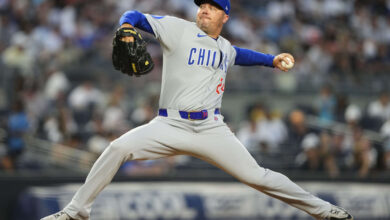
Cubs Fail to Reach Agreement with Kyle Tucker, Sides $2.5M Apart in Salary Filings
At the risk of ascribing too much importance to a situation that could end up being a nothingburger, failing to reach an agreement with the star they just traded for feels like a serious misstep by Jed Hoyer and the Cubs. While it’s entirely possible the two sides could still reach an agreement prior to reaching the arbitration table, which would truly be a huge oof, the optics here aren’t good. As first reported by Jesse Rogers, the Cubs and Kyle Tucker are $2.5 million apart in their filings.
Tucker filed at $17.5 million, well below the market value for his production, while the Cubs filed at a $15 million figure that is just shy of his projected $16 million salary. It’s also just shy of insulting, particularly when you consider how trading for him was a move that carried a whiff of desperation as both Tucker and Hoyer are entering their final season of contractual control. This is almost like the Bears refusing to pay for a first-class ticket to bring coaching candidates in for interviews.
To be fair, that is a dated anecdote and maybe the McCaskeys are willing to pay more to bring finalists to Chicago once they’ve finished holding Zoom calls with however many dozen candidates they’ve identified.
Back to the Tucker situation, which is really more of a facepalm “Oh, Cubs” moment that probably doesn’t have much meaning outside of supporting the narrative that ownership is cheap. Tucker and his camp know this is a business and they’ve also got almost no relationship with the Cubs organization, so it’s not like this is a sign that things have soured. To wit, the Cubs failed to reach an agreement with Ian Happ two years ago and then ended up working out an extension with him.
I’m not saying that means it’s likely they do the same with Tucker, only that it doesn’t necessarily mean an extension is unequivocally out of the question. But, again, this isn’t a good look when considering Tucker’s stature and relatively low cost, especially when he’s in line for a massive deal that could very well double the largest contract in Cubs history. Add in the $25 million they saved by trading Cody Bellinger, and it’s understandable that fans are upset about this.
In the end, it probably only matters if the two sides end up going before an arbitrator and the Cubs have to explain why the best player on the team who they just traded for isn’t actually worth as much as a mid-tier free agent.

